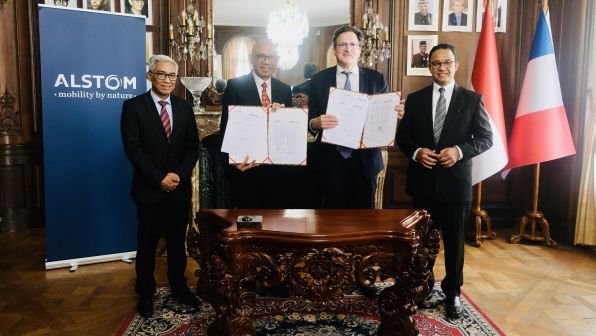ALSTOM has signed a Memorandum of Understanding (MoU) with MRT Jakarta, the developer and operator of the Mass Rapid Transit (MRT) network in the Indonesian capital, which will see the two parties collaborate on the development of future phases of the network.
MRT Jakarta is looking to build a 235km network by 2035 to reduce congestion and improve air quality in the densely-populated Greater Jakarta region.
The next stage of this programme includes Phase 3, known as the East-West line, which will run for 87km and serve 40 stations.
Alstom says that it will draw on its extensive experience of integrating complete urban transport systems that include rolling stock, signalling, infrastructure and services. It will support MRT Jakarta in identifying suitable technology and procurement schemes for its expansion programme.
The MoU was signed by Mr William Sabandar, MRT Jakarta president director, and Mr Didier Valiere, pre-tendering support and marketing director at Alstom.
“With Alstom, we will delve into a cooperation to build the most appropriate urban rail system for Jakarta, from the aspect of trains, signalling, to an efficient procurement scheme for equipment and services for MRT Jakarta,” Sabandar says.
Separately, Alstom has signed an MoU with the Faculty of Engineering at Chulalongkorn University (Chula Engineering) in Thailand which seeks to foster greater collaboration in local industry research and development, as well as educational and training programmes in railway engineering over the next five years.
Leveraging the synergies between industry and academia, Alstom says the agreement will provide a practical platform for engineering undergraduates to develop their railway skills. This will include internships and practical training programmes.
“When students can engage in practice with market-leading players like Alstom and learn real applications in the industry, they will be able to enhance their skills and sharpen their knowledge,” says Professor Dr Supot Teachavorasinskun, dean of Chula Engineering.
Over 20 graduates of Chulalongkorn University across a variety of disciplines have joined Alstom in Bangkok in recent years, working on transport projects at home and abroad. The Bangkok hub has grown to become one of Alstom’s three global engineering centres for the Asia Pacific region, employing over 450 engineers of whom 85% are from Thailand.
With the Thai market set to grow, Alstom is looking to add 20% more staff to its workforce in Bangkok by the end of this year and has recently launched a recruitment drive for engineers, technicians and data scientists.
For detailed data on Asian metro projects, subscribe to IRJ Pro.

